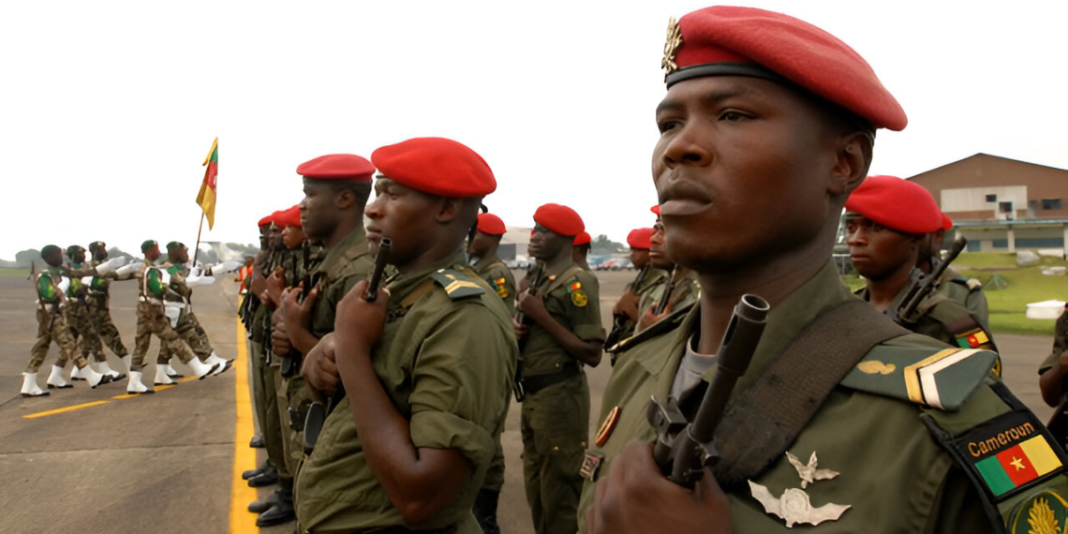Cameroon is grappling with a significant security challenge as its soldiers abandon their posts to fight in the Russia-Ukraine war. The trend, which has intensified since Russia’s 2022 invasion of Ukraine, weakens the operational capacity of the Cameroonian military and threatens national stability.
Growing Desertions and Government Response
In a statement on 7 March, Defence Minister Joseph Beti Assomo acknowledged the ‘illicit involvement’ of Cameroonian troops in the Ukraine war. While some deserters join Ukraine as ‘foreign volunteers,’ most enlist with Russian forces, earning them the label ‘Putin’s Tirailleurs’ (riflemen).
Although no official desertion statistics exist, the situation is alarming for a country facing threats from Boko Haram in the north, Central African Republic rebels in the east, maritime piracy along the coast, and the ongoing Anglophone crisis in the west.


A History of Military Desertions
Cameroon’s military desertions began in the late 2010s, with elite soldiers lured by lucrative security jobs in Dubai. By 2018, reports indicated between 300 and 800 deserters. In 2020, 637 soldiers faced dismissal for abandoning their duties, prompting the defence minister to temporarily suspend overseas deployments.
Now, the Russia-Ukraine war presents another opportunity for soldiers seeking better financial prospects. Recruiters connected to Russia have facilitated Cameroonian enlistment, offering monthly salaries between XAF 1.2 million ($1,976) and XAF 1.5 million ($2,794), with specialists receiving at least XAF 2 million ($3,294). These figures align with British military intelligence, which cites a $2,000 sign-on bonus, a $2,200 monthly salary, and the promise of a Russian passport.
Economic and Professional Motivations
The desertions highlight the economic disparity between Cameroonian and Russian military wages. A second-class Cameroonian private earns just XAF 51,880 ($85) monthly after two years of service, with an additional risk and food allowance of XAF 90,000 ($148) in active zones. Comparatively, Russia offers at least $2,000 per month for frontline deployments.
Professionalisation of the Cameroonian military, initiated in 2001, has also contributed to the trend. Soldiers now view their service as a career rather than a lifelong national duty, with contracts lasting three years for enlisted personnel and ten years for officers. Many soldiers are automatically re-enlisted but are unaware of their contract terms, leading to frustrations and increased desertions.


National Impact and Brain Drain
The exodus of soldiers reflects a broader issue affecting Cameroon, as healthcare workers and teachers also seek opportunities abroad. Between January and May 2024, the International Organization for Migration recorded 7,448 Cameroonian emigrants, with 6,099 heading to Canada and 971 to the United Kingdom. This growing migration concerns both the Cameroonian Employers Council and President Paul Biya.
For the military, desertions undermine recruitment efforts, disrupt unit cohesion, and drain expertise. Some battalion commanders report key personnel leaving, weakening the armed forces’ operational capacity.
Potential Security Risks
Authorities are particularly concerned about the future of these deserters. Some fear that Russia could form an Africa Corps composed of battle-hardened African soldiers. Others warn that returnees, having gained high-intensity combat experience in Ukraine, could pose a direct security threat to Cameroon.

Measures to Curb Desertions
To address the issue, Cameroon’s Defence Minister has tightened oversight of military personnel. Soldiers must now obtain direct ministerial authorization to leave the country. Deserters face dismissal and possible prosecution.
Beyond punitive measures, Cameroon’s army must adopt retention strategies to keep skilled personnel. Improving conditions for soldiers deployed in high-risk zones, increasing troop rotations, and enhancing compensation packages could help reduce desertions. Additionally, implementing promised benefits such as emergency housing and better medical care could bolster loyalty and commitment among service members.
Cameroon’s security challenges require a well-trained and dedicated military force. Addressing the root causes of desertion is crucial to ensuring national stability in the face of growing external and internal threats.




